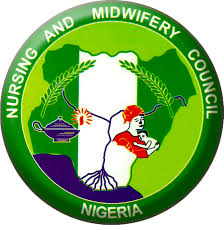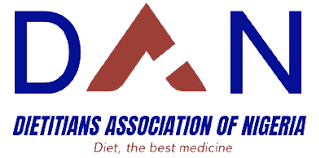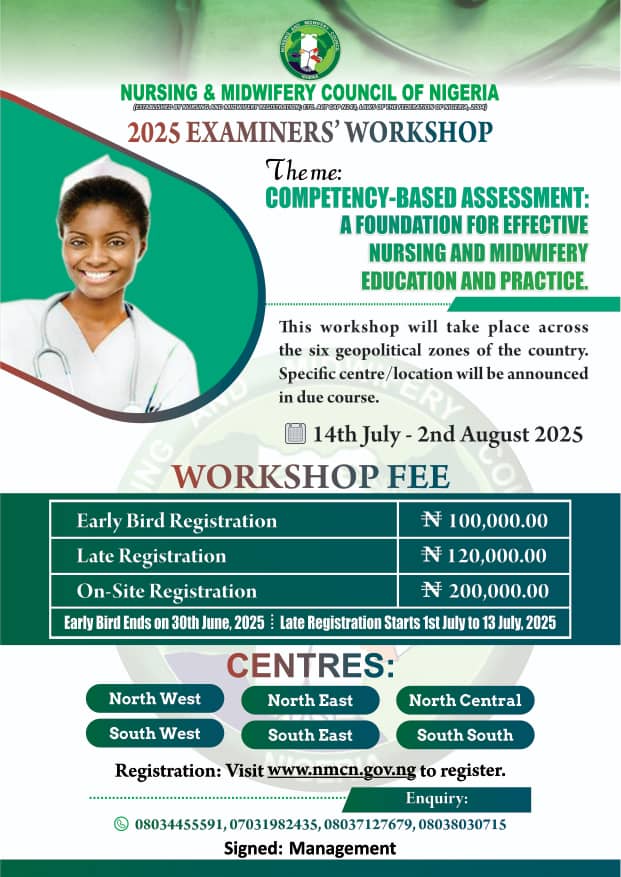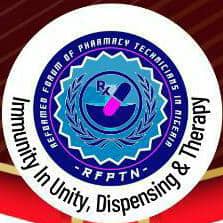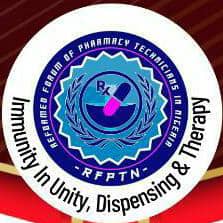CONCERN PROFESSIONAL COMMUNITY HEALTH PRACTITIONERS OF NIGERIA
14th August, 2019
THE CHAIRMAN,
COMMUNITY HEALTH PRACTITIONERS
REGISTRATION BOARD OF NIGERIA (CHPRBN)
FEDERAL MINISTRY OF HEALTH,
ABUJA
Sir,
SUGGESTIONS ON HOW TO MOVE COMMUNITY HEALTH PRACTICE FORWARD IN THE 21st CENTURY, ALIGNING WITH THE REALITIES OF THE MODERN TIME
.jpg)
INTRODUCTION
With due respect and honour, we congratulate you and your board members on your recent appointments by the President and commander in chief of the Armed Forces of the Federal Republic of Nigeria Muhammadu Buhari. We are optimistic that with your open and innovative minds, development shall come to stay in making community health practice in Nigeria one of the best profession in the world. We are proud of you and the profession, community health practice.
We as concerned members of the profession, hereby express our readiness and determination at ensuring that you succeed during your tenure in office, by ensuring that positive and better development are brought to the profession. These will go along to place community health practitioners in the best position and take centre stage in nation's primary health care delivery system.
Community Health as we all knew is a branch of medicine that concentrates on prevention of communicable diseases, early diagnosis and treatment of diseases, rehabilitation and mobilization of individual and community for healthy living.
Community health practitioner in the other hand is a professional, competent, and a licensed personnel that is qualified to carrying out all functions of primary health care at clinics and the community level. Decree 61 of 1992, now Cap 19, 2004 law of Federal Republic Of Nigeria, "Regulations of community health practitioners and matters connected therein" refers
The law is clear and unambiguous that sky is the limit of innovations and development for this profession.
It should be noted that not every community health worker is a community health practitioner. A driver, community leader, Nurse, Doctors etc, all constitutes community health workers. But only trained and certified professional with practice license issued by CHPRBN is termed a community health practitioner. A primary health care pioneer.
2.0 BRIEF HISTORY OF COMMUNITY HEALTH PRACTICE IN NIGERIA
Community Health Practice is one of the oldest health care profession that has brought health care closer, beneficial, and have also offered advantageous value to every society and the nation at large, as health care issues are easily rectified at the lowest level to the benefits of patients, immediate and the larger society. Hence the need for emphasis to empower them to do more, so that health for all will not just be a mere phrase, but a reality.
Before independence, the nation lacked enough healthcare personnel to manned healthcare facilities in our communities. This necessitated the need for human resources development. During this period, rural heathcare officials were trained that effectively rendered services that addressed the healthcare needs of communities, and refered complex cases to hospitals. These set of people metamorphosed through training and re-training to today's Community Health Practitioners.
The duties and sacrifices of this profession (community health ) practice is seen and felt in various localities. They could be further described to as committed healthcare professionals that gives basic care to people at the grassroot, hence their profession must be accorded a better scope in order for the slogan "health for all" to be attained. With these, we can say no any other profession is designed in as such in scope and practice that can do it better than they do. They are polyvalent workers, based on the training they receives.
Today, in every part of our society the most available healthcare personnel you can easily access are the community health practitioners, who takes the burden of various health needs of every society they found themselves and performs within their capacity and then refer complex cases immediately to appropriate centres.
Physicians, consultants and other health professionals do not live with their own people, they go to cities thereby leaving the major populations who predominantly stays in the rural communities with the burden of search for healthcare services which only Community Health Practitioners are the only personnel left to doing the needful. It is on this that it becomes necessary to upgrade their knowledge and scope of practice.
Its high time community health practitioners be awaken to the reality of the present days, and take charge of their own profession, so that they could exploit their own potentials as several other health professionals appeared to undermine them by amending their own training curriculum to enable them to take over our roles and thereby relegating community health practitioners stylishly. It therefore became necessary to put a stop to this act currently being perpetrated by other health professionals who wish to perform functions similar to that of CHPs.
3.0 CHALLENGES FACING THE NOBLE PROFESSION
ISSUES AGAINST PRIVATE PRACTICE OF COMMUNITY HEALTH PRACTITIONERS
Recently in nnnews Nigeria as published by Adebiye Adeyemi 10/5/19, lamented on how community health practitioners were in agony following their deliberate elimination in the health facilities monitoring and accreditation agency (HEFAMAA) approval of private health facilities for various health care professions. There was a presentation by the community health practitioners to Lagos State House of Assembly on this. Its disheartening to note that the agency relegated our profession to just 'mere'
Community health practice is about the most self sustaining, independent, private driving opportunity in the health sector, but look at the relegation befalling us wrongly now by HEFAMAA
We hereby call on the attention of the leadership of the board and also Association of community health practitioners to intervene and resolve this matter and condemn it as an act of injustice against our profession.
It should be noted that our people even before colonial rule were engaged in heading clinics and dispensaries independently. To say we have no capacity to independently operate, we think its nothing but a deliberate insult and smear on the profession. This is why we have severally being saying that there exists rivalry by other health professionals matted on we community health practitioners. HEFAMAA's position is another example.
MINISTRIES, DEPARTNENTS AND AGENCIES DESCRIMINATION
Some ministries and departments are in the verge of discrimination against our members eg Nigeria customs, immigration, civil defence, prison service etc
Our members who have the same entery requirements, training duration and are even scientifically better than Nurses are being relegated into their employment service
Nurses are given inspectorate post, while our people are relegated to assistant inspector and some times even rejected on the guise that their qualification is either not Diploma or any other flimsy excuse.
The board and association should please note this and resolve this matter with immediate effect.
Similarly, a recent scientific report released indicting "poor primary health care policies implementation as responsible for 80% of death in rural communities in Nigeria" on premium time 5/8/19 by the Epidemiology Society of Nigeria under the auspices of Public Health Practitioners of Nigeria as made known by Tolu Fakaye.
We take this issue serious as an indictment and a designed smear by detractors of professional body meant in design and implementation to carry out primary health care duties (policies and implementation). The conglomerates that constitutes the National Primary Health Care Development Agency (NPHCDA) should be blamed for this as its an indictment on their performance.
Several policies have been constituted since the later creation of this Primary Health Care Development Agency and the policies can be said to have negatively affected genuine progression of PHC, this leading to negative reports like the particular one released by Public Health Practitioners of Nigeria.
Before it's establishment, Federal/State/Local Governments, Ministries of Health used to have a departments called; Department of community health (Primary Health Care), which in conjuction with appropriate national and international organizations do formulates policies along with states and local government areas and that do bring about easy accessible, effective and efficient delivery and more positive yield.
Community health practitioners are the ones who pioneered the process in the 1970s to 2000s, marking the end and beginning of 20th and 21st centuries respectively. It led to Primary Health Care receiving a boost, which was felt across the nation. Local Governments were responsible for addressing the plight of the Clinics and village /community health needs, immunization, provision of essential Drugs, and home visits were done and there was massive improvement in the healthcare status of the nation. But at last, the elimination of these concepts by subsequent policy makers, who we can say do such deliberately to bring to an end the critical clinical functions of community health practitioners. The duties they were doing well before and was seen to yield positive outcomes. Intricacies could be said to have undermined us by detractors of our good wills. Interfering with our defined roles, to even attempting to relegate the standard of our performances as stipulated in our guiding principles "the standing orders" its it vivid that the detail contents of the olden editions of the National Standing Orders allows more clinical actions to be carried out including intravenous fluids administration in the management of epdemics like severe diarrhea and vomiting. It can be seen today that all these have been marred, leaving the noble profession with skeletal contents now following subsequent reviews. Hence the need for further review to enable members tackle the present circumstances that will bring about enhanced community health care and healthy society.
ESSENTIAL DRUGS LISTS/SUPPLY
Essential drugs lists and supplies that used to tackle major health challenges at primary health care level appeared not an emphasised area today. But we believe that with your new and able leadership of the board this profession shall articulate possible way out for the nation geared toward returning and giving the profession it's actual outlook as the most preferred with capacity to salvage the nation's primary health care, which remained the key to attaining "health for all".
COMMUNITY HEALTH HAS NOW MATURED TO STAND ON IT OWN
To had existed for sometimes now, efforts must be made to make the profession self sufficient, relevant and focused.
THE HISTORY OF PRIMARY HEALTH CARE IN NIGERIA
According to Samuel Ajah "The Declaration of Alma-Ata was adopted at the International Conference on Primary Health Care (PHC), Almaty (formerly Alma-Ata), Kazakhstan (formerly Kazakh Soviet Socialist Republic), 6–12 September 1978. It expressed the need for urgent action by all governments, all health and development workers, and the world community to protect and promote the health of all people. The Alma-Ata Declaration of 1978 emerged as a major milestone of the twentieth century in the field of public health, and it identified primary health care as the key to the attainment of the goal of "Health for All" around the globe.
After the Alma - Ata conference, the world health Coordinators/Director who later became Minister Of Heath, late Prof. Olikoye Ransome - Kuti, thought of using the nurses to actualize the Alma -Ata declaration. He wanted to include the PHC training syllabus in the nursing training syllabus so that nurses can be posted to work in the rural areas. But the nurses kicked against the idea, that they are trained to work in Urban areas, not in rural areas. Consequently, the idea to train a new cadre of health workers to be known as community health practitioners was conceived.
Admission of candidates into various Schools of Heath Technology, which some are now addressed to as Colleges of Health Sciences and Technology (CHST) across the country for the training of Community Health Practitioners commenced in September, 1978, with the following cadres: Community Health Aide (now JCHEW), Community Health Assistant (now CHEW), and Community Health Supervisor (now scrabbed), and Community Health Officer (CHO). The duration of the intensive studies for the courses were 1 year, 2 years, and 1 year respectively. Moreover, all programmes in the CHST started as certificate courses but later advanced.
When the pioneer sets of Community Health Practitioners (CHPs) were inducted and posted to the field (because employment was automatic then), the nurses discovered to their amazement that the CHPs are better trained and have more wider scope of practice than them. For example, unlike the nurses, the CHPs can consult and prescribe medications for patients and also do minor surgery without the supervision of a Medical Doctor, that sparked off unhealthy rivalry. That is why they are doing everything possible to undermine the community health practitioners and take over Community Health Practice.
To achieve that aim, some of the Nurses and others have switched over to Community Health Practice by going through the Community Health Officer (CHO) training. But the major consequence of this is, "they are working as CHPs but their allegiance is totally to the Nursing, and other profession.''
STRUCTURES OF HEALTH SYSTEM
Health system is structured into three categories such as;
- Primary
- Secondary
- Tertiary
Primary Health Care: is the closest health care structure to the people, that makes health care accessible, affordable, effectively and efficiently to the people at the community level.
This component of health care system is designed to be manned by Primary Health Care Workers with Community Health Practitioners as team leader. This is meant toward achieving Primary Health Care components accomplishment.
The Community Health Practitioners' duty as custodian of Primary Health Care by all intesion and design includes but not limited to:
- Prevention of communicable diseases
- Early diagnosis and treatment of diseases
- Maternal Health Care (ante-natal, intra-partum, post-natal cares and family planning)
- Geriatrics
- Child Health Care
- Environmental, nutritional education and care
- Mobilization and rehabilitation for healthy living
- Adequate knowledge of drugs administration and management
- Dental, and eye cares
- Administrative and managerial functions etc
1. Primary Health Clinics/Centers
Health Post: to be headed by Community Health Aides or Junior Extension Workers (JCHEWs)
Primary Health Care Clinics or Centers (PHCCs): meant to be headed by Community Health Assistant or Community Extension Worker (CHEWs)
Comprehensive Health Clinic or Center (CHC): to be headed by Community Health Officer (CHO).
In this stage other Health Professionals may be included for their expanded healthcare scope. A Medical Doctor who takes care of advanced medical problems within the centre is required. Other health professionals e.g Nurses, Midwives, Pharmacy Technicians, Medical Laboratory Technicians and other health workers are also sometimes available .
2. Secondary Health Care
This is the second stage of health care, which manages mildly complicated cases that are referred from Primary Health Care Clinics or Communities. This stage is manned by Medical Doctors as heads, Nurses, Laboratory scientists, Pharmacists, and other categories of health workers who form the team.
3. Tertiary Health Care
This is the highest level of healthcare that handles more serious, complicated and advanced or specialised cases by specialist medical or other scientific officers.
This stage of healthcare is manned by Medical and scientific specialists from diverse fields.
In all, a standardised, structured, effective and efficient Primary Health Care is the root to a healthy society and the basic strategy for the attainment of "health for all" hence the need to empower Community Health practitioners capacity with knowledge updates, skills and broaden scope of practice in line with modern scientific and technological break through is the only way out
THE ESSENCE OF HAVING COMMUNITY HEALTH PRACTITIONERS
Since the creation of this noble profession that concentrates and pioneers all activities at Primary Health Care level, the roles they are meant for, when evaluated have tremediously contributed to a healthy living both at national and global level.
All cadres in Community Health Practice are valuable and essential considering the vital roles they play at Primary Health Care and general healthy living in society.
The cadres are:
- Community Health Aides or Junior Extension Practitioner
- Community Health Assistant or Community Health Extension Practitioner
- Community Health Officer
These cadres of community health are consciously designed ,each with specific roles expected of them, which is to bring about easy accomplishment of accessible, affordable primary health care by licensed Practitioners. From time in memorial the cadres are valid and valuable, and shall remained cardinal which should be accorded respect and status to practice according to their trainings and specified scopes.
ISSUES OF PRESENT TIME (ACADEMICS)
Today across the world, innovations and educational advancement has becomes the order of the day. Bachelor Degrees and other higher degrees are being pursued across the world with view to contributing to the existing practice for better productivity. Community health shouldn't be an exceptional in this guise and should not be relegated by it own professional regulatory body.
The Community Health Practitioners Registration Board of Nigeria (CHPRBN), and National Association of Community Health Practitioners of Nigeria should be alive to see the modern realities and requirements as most of the Schools offering Degrees/HND are not issued licence to practice. This may have happened because the universities may not be affiliated nor the students indexed with the body.
4.0 CONCLUSION
We are determined with approval of the board to support it by rendering any needed service that will move the profession forward in the right perspective toward achieving efficient noble profession with quest for betterment and successful Primary Health Care delivery.
5.0 RECOMMENDATIONS
We recommend that the board should in accordance with the provisions of the law establishing community health practice part |||, put in place a policy directives that will make it clear to all training institutions to be able to have their products or students licensed. This can be done by ensuring that training requirements are made available to the institutions, which they must complied with, both the theoretical, practical attachments and demonstrations.
All Students admitted should be indexed from the first year of entry into the training institution, so that at completion of their degree program they will then sit for practicing licence examinations of CHEW or be given the license to practice. Other professions have room for professional registration of their members after certifying the laid down conditions for example in Medicine, Nursing, Accounting, Law, Architect etc. We therefore say; Community health practice should not be an exception.
The Board and the Association should be alive in National Primary Health Care duties by making members to be active and contributors to National healthcare policies, updating members through seminars, newsletters, success stories of practitioners, magazines etc and should be sustained and continued to be organised from time to time across the nation. Active role in Sensitizations on prevailing national health issues is cardinal, for example, during Ebola outbreaks, the association should have printed training scripts across the nation to be applied by her members across the rural communities to be used in enlightening the people in all communities, but the leadership appeared to be mute thereby giving room to other professions to take over our roles. This is bad, redress is necessary now.
There is need to specialise in Community Health Practice for practitioners, section ||| of the law permits the board to be in charge of training and could innovate and gazzete such, specialization in various components of community/Primary Health Care. For example;
- Community Clinician or Physician Associate
- Community Mental Health or Psychiatry Associate
- Community Dental Care or Dental Associate
- Community Geriatrists
- Community Maternal Care or Obsetrics Associate
- Community Accident and Emergency or Minor Surgery Associate
- Epidemiology
- Health Administration and Management
- Health Education, Rehabilitation and Mobilization
- Serology, Eye, Dental etc
They shall be trained uniquely in these fields specialising on each by individual. Those trained will be able to handle less complicated cases regarding each area and refer severely complicated ones upward in line with the scope of practice and operation of two-way referral system. They should also be managing special cases that are managed at secondary or tertiary centres and refered back to the communities by the experts for continuity of care at community level
We need recognition of people with higher Degrees who had excel in any area of community or primary health care. A special professional exams should be set for them to pass and be issued licence to practice. Only students of institutions accredited or registered with the board and follow the board instructions, and who satisfied all training requirements and instructions shall be allowed to sit for such professional licensing exams. While those graduates who have been registered before through CHEW/CHO need not to sit for registration or licensing exams but should be made to pay fee for registration.
Masters and PhD in community health are also needed and should be recognized by the board as they shall serve as research and development members, instead of relying on Medical Doctors and other professionals to be doing our job thereby making it look as if we don't have able hands that can handle things better. We should grow to be able to do things on our own as statutory profession.
It will interest you to know that we have vibrant and competent manpower now spread across the country that can bring better innovation to the profession without any bias instead of being adamant.
Members who also have acquired additional qualifications in other fields outside community health e.g Accountancy, Public and Business administrations, Sociology, Medical, Health and other sciences. We therefore recommend that when the services of any of such professions is required, registered community health practitioners among them should be given more priority. This becomes necessary to safeguard the profession from the intricacies of the jealous ones (saboteurs) within that wants to kill the noble profession at all cost.
FELLOWSHIP IN COMMUNITY HEALTH PRACTICE, AND THE NEED FOR CREATION OF AN INSTITUTE OF COMMUNITY HEALTH PRACTICE RESEARCH AND DEVELOPMENT
The Association and Board should seek legal means through gazette or registration with cooperate affairs commission or seek legislation from National Assembly where members and other contributors certified by the body could be awarded honours in community health practice. This will go along way to bring the status of the body to the highest peak it should had ascended to. All these are to be strictly for the interest of community health practitioners alone as a statutory profession.
Fellow; reserved for members with professional recognition. Example; CHEW, CHO, BSc, MSc and PhD holders with innovative and gainstanding contributions to the profession.
Consultants; community health institute should have training curriculum same with Community Physicians for her PhD holders, so that they could be addressed as Community Health Consultants with affiliation to international bodies for better recognition.
Training Standardization; the segemented approvals for Private Colleges of Health Technology training community health courses any how should be controlled. Strict requirement should be laid down to be met, including having atleast three (3) PHC tutors, Practical demonstrations laboratory, Standard Buildings Structures etc. The training must be highly standardized, otherwise the integrity of the profession will erude in no distance time, which will be bad for the profession.
The time Community Health Practice should move as a real profession of time is now. We all must therefore be contributors toward it's success.
The National health care sustainability depends mainly on efficient, effective, community health practitioners, who are the pioneers of primary health care services.
The board should in accordance with the law be constituted by people who are registered community health practitioners, except representatives of Medical Council and even in this regard, the representative must be a community physician.
The representative of Minister of health, the Minister should endeavour to nominate a Registered Community Health Practitioner. Except where he is represented by his nominee who is a senior member of his ministry.
Other representatives coming from training Colleges and universities, must also be a registered community health practitioner, while the remaining members must possess either Aides, Assistant, CHEW or CHO licences.
Where a board member is not a registered practitioner, except the Minister's representative, such a member should be petitioned and to be replaced immediately.
We also wish to advice that in appointing personnel to the board, Secretary and others board should endeavour to appoint only RCHP.
The National Standing Orders need to be reviewed upward in line with modern time realities in science and technology
The board or association should have a day in a year to be tagged: Community Health Practitioners Day to commemorate the life and time of community health practitioners' founder Late Prof. Olikoye Ransom Kuti. The day shall be declared, where specific health issue shall be the topic for discussed by experts. Also as part of activities to be line up shall include home visitation with information and communication materials, and a centre within each ward to attend to people with different ailments and then refer complex ones as usual freely
The board together with our association must try to find out what the problem is in regard to recruitments and resolve it immediately.
We hold and accords our certificates high regard, but it will still not be a bad idea if they are buttered to bear academic qualifications in addition to it still maintaining it professional value and status. Example; the JCHEW, CHEW and CHO be awarded Certificate, National Diploma, and Higher National Diploma respectively.
With Community Health Practitioners, the concept of "health for all" is achievable.
Written by:
Comr. Mu'azu Isah,
RCHP (CHEW), Cert in Media and Information Literacy (MIL), BSc Community Health in view
08073496336, 08062513968
Contributor:
Mr. James J. Kolo, (RCHP), MBA, Mnim
08097685992
Co-signatories:
Comr. Jacob Peter Zargina,
RCHP (CHEW), BSc Community Health (Yola)
0703 563 8950
Comr. Yunusa MT Kutigi,
RCHP (CHEW)
0806 084 5781
Comr. Basiru Tanko,
RCHP (CHEW), NDCH, HND in view
0803 850 3620
Comr. Abdullahi M. Erena,
RCHP (CHEW), CHO in view
08065196408
Comr. Abubakar Sadiq Ibrahim,
RCHP (CHEW), CHO in view
08058626964
Auwalu Alhassan Ningi,
RCHP (CHEW), BSc Community Health in view
08071804900, 07068813444
Cc
The Chairman
National Association of Community Health Practitioners of Nigeria (NACHPN)
This is for your information and positive actions please!
